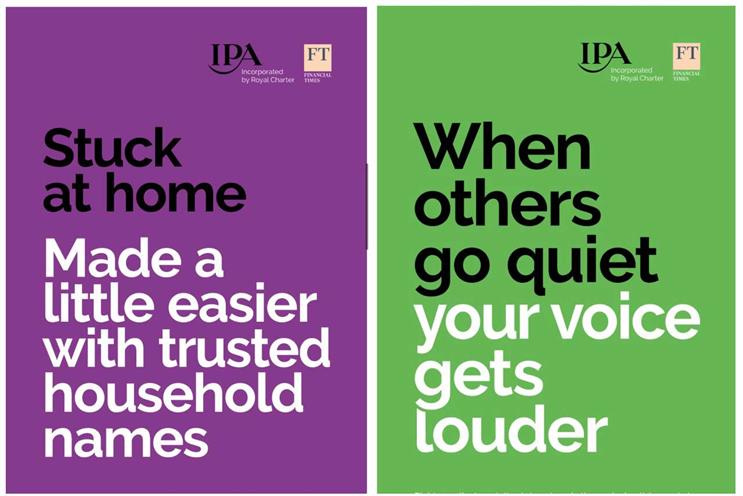A bellwether derives from Middle English and refers to the practice of placing a bell around the neck of a castrated ram (a wether) leading the flock of sheep.
And so this apt name was chosen for the IPA Bellwether Report. Born 20 years ago today.
A report designed to show the direction and destination of UK marketing spend. To act as a barometer of the health and sentiment of the marketing industry and UK plc at large. To provide an insight into the threats and opportunities keeping UK marketers up at night.
So where are we now, what have we weathered over the past 20 years and, crucially, what can we learn from this to aid us in our recovery from this latest downturn to bounce back in good shape?
Looking at the Q1 2020 Bellwether results, published today, it looks like marketing budgets have themselves been castrated – I’m referring to the less overt definition: that of being "deprived of power, vitality or vigour".
In light of the pandemic, it is no surprise that marketing budgets have taken a hit as the stay-at-home directive has caused a sudden stop in most consumer and business spending. Coupled, of course, with plummeting confidence from marketers about both their own company and their sector’s financial prospects.
The last time we came close to such a decline into negative territory was from the fallout of the global financial crisis in 2008-2009. During this time, the Bellwether’s nadir measured a net balance of -41.7% of UK marketers revising their marketing budgets downwards in Q4 2008.
From this low point, it took five quarters to bounce back into positive territory, with a net balance of +4.5% of UK marketers revising their budgets up in Q1 2010. Following some further, more minor, fluctuations we then hit the Bellwether high point in Q1 2014 at +20.4%.
This year’s Q1 fieldwork was undertaken during 2-27 March, closing just a few days after the government officially enforced the lockdown to stem the spread of Covid-19; it shows a net balance of -6.1% of marketers revising their budgets down. We can be certain that Q2 will document more negative territory, but we are hopeful of a less bleak outlook by the latter quarters of the year and therefore, potentially, a sharper bounceback than previously.
Of course, this mostly hinges on the length of lockdown. It also heavily depends on the decisions we make now to weather the downturn. One of the biggest problems is the temptation of the C-suite to cut or cancel their ad budgets. My friend Paul Phillips at AAR likes to quote Mike Tyson: "Everyone has a plan until they get punched in the mouth."
To try to reassure business leaders that a knee-jerk reaction to cut advertising is misguided, the IPA has been running a campaign in the Financial Times using evidence garnered by effectiveness guru Peter Field.
Field is keen to point out that there are, of course, significant differences from a downturn caused by a pandemic than from one caused by a global financial crisis. (Many dichotomies exist this time: highly polarised between essential and non-essential; elevated or panic buying versus market closure; serious supply restrictions versus no supply; a fortunate minority of scalable businesses serving essential needs to homebound consumers, for whom this is an exceptional opportunity for growth.) And he remains convinced that, for most advertisers, a short-term strategy shift makes very little sense this time.
He explains that when recession looms, it is understandable if businesses try to shore up short-term profits by cutting variable expenditure, such as advertising. However, evidence from past downturns shows that unless companies are saving cash simply to survive, or because they can no longer supply advertised services, cutting ad budgets – relative to competitor spend – is a high-risk strategy. Such a move exposes businesses to losing market share, forgoing sales and delaying the recovery of profits in the long term.
So, while this downturn is not the same as the global financial crisis, there are, according to Field, seven lessons that can be applied to help us weather it:
- Do not panic and withdraw brand advertising, unless short-term survival depends on it
- Do not go for short-term sales activation tactics
- Defend your share of voice (unless short-term survival is at stake)
- Take advantage of cheaper share of voice to drive growth in recovery, if you can
- Don’t throw away a good brand campaign
- Emotions work even more than usual during recession
- Behaviours are especially important in this recession. Be innovative. Ask yourself: how can we help?
And, if nothing else, remember this: brands that hold their nerve will gain extra share of voice, which will achieve competitive gains. Procter & Gamble knows a few things about how advertising builds businesses and earlier this week its chief financial officer Jon Moeller said: "This is not a time to go off air."
In John Donne’s poem No Man is an Island, he says ask not for whom the bell tolls. It is for all of us. Whatever affects one affects us all. The same could be said of the tolling of the Bellwether.
To recover and thrive going forward will require concerted and collective effort from all sides – businesses, marketers and agencies. And a widespread understanding from all of the value and power of advertising to transform businesses.
Now is the time to help advertisers hold their nerve and to remember: when others go quiet, your voice gets louder.
Paul Bainsfair is director-general at the IPA


